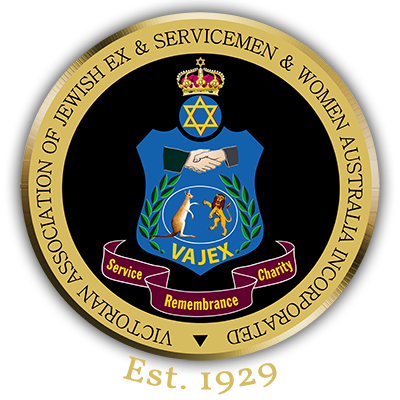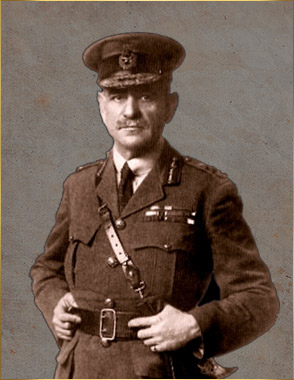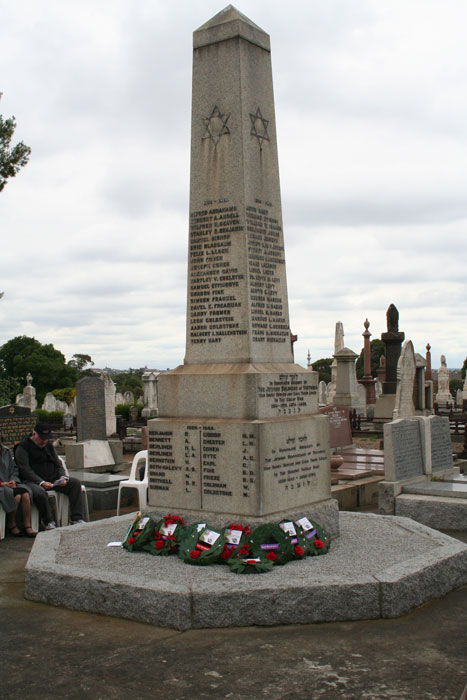Victorian Association of Jewish Ex & Servicemen & Women Australia Incorporated
Founding Member General Sir John Monash GCMG KCB VD
Rosenthal MBE
Surname
Rosenthal MBE
First names
Newman Hirsch (Henry)
Rank
Squadron Leader
Service No.
253779
Date of Death
31/01/1986
Hebrew Date
21 Sh'vat 5746
Hebrew Date
כ״א בִּשְׁבָט תשמ״ו
Age at Death
87
How Died
Where Died
Melbourne, Victoria, Australia
Cemetery
MCK Cemetery, Springvale, Victoria, Australia
Service Details
Education Officer, Director of Training, AHQ, RAAF
Served
Occupation
Lecturer Melbourne University, Director of Visual Education
Age at Enlistment
Place of Enlistment
Locality on Enlistment
Religion
Jewish
Gender
Male
Date of Enlistment
12/11/1941
Date of Discharge
1/10/1946 then to Reserve
Country of Enlistment
Australia
Notes
Born 8/8/1898 Ballarat, Victoria. Called up for 3 months, March 1951 appointed Air Attache in London 13/4/1951 then appointed Air Attache in Washington May 1951. Returned to Australia June 1951. 31/7/1951 Ceased duty, placed on active reserve as Education Officer and reverted to Squadron Leader. In 1917, after completing secondary education at Ballarat Agricultural High School, Rosenthal joined the Victorian Education Department and returned to his former school as a junior teacher. The following year he entered Melbourne Teachers’ College, and enrolled in science (education) at the University of Melbourne. After graduation (BSc, BA, 1922) he resigned from the department and taught at Xavier College, Kew, where he remained as chemistry master until 1940. On 1 September 1927 at the St Kilda Synagogue he married a fellow teacher, Adelaide Clarice Esther Pizer. During World War II, on 12 November 1941 Rosenthal was appointed as an education officer, with the rank of flight lieutenant, in the Royal Australian Air Force. Promoted to squadron leader (1942), he headed the Visual Training Section at Albert Park that produced instructional films and film strips. When in July 1946 the section was transferred to the University of Melbourne, he was appointed as director - a position he was to hold until his retirement on 30 April 1966. He was demobilised from the RAAF on 18 September 1946. Later he joined the RAAF Reserve and carried out full-time duty in March-July 1951 and October-December 1952 as an acting wing commander. The university’s visual aids centre continued to produce films and film strips for the armed services, as well as for Australian educational institutions. It began also to investigate the use of new technologies; television particularly interested Rosenthal. From 1955 he directed the university’s television research program and pioneered research into its use in teaching. While in the RAAF, Rosenthal had visited service and university visual aid centres in the United States of America in 1945 and he had travelled to Britain, Europe and the USA in 1951 to study the educational use of films and television. Throughout his professional life he continued to travel to Europe and North America to undertake investigations and represent the university at international conferences on the use of visual aids for educational purposes. His research focused on audience reaction, especially that of children and adolescents, to films. He believed education should avail itself of new technologies, and advocated high-quality programs and the teaching of critical-viewing skills. His early published work included Films - Their Use and Misuse (1945), Films - A Teachers’ Manual (1947) and Films in Our Lives (1953). Rosenthal’s expertise was recognised by his appointment as foundation president (1950-54) of the Victorian Council for Children’s Films (and Television) and his membership (1948-79) of the State Film Centre Council. Although scientific pursuits were predominant in his professional life, Rosenthal’s interests extended into the humanities. His attraction to literature was fitting, given the family’s long association with it: his maternal grandfather, Newman Spielvogel, had been a scholar and newspaper correspondent, and his uncle, Nathan Spielvogel, was a writer, historian and teacher of repute. Rosenthal edited the Teachers’ College journal The Trainee in 1919, the Australian Jewish Herald from 1926, and later the Australian Jewish News. He wrote institutional histories and biographies (including of Sir Albert Coates and Sir Charles Lowe), frequently contributed to daily newspapers, and reviewed many books about Jewish history and culture. Much of his writing reflected an interest in the history of Jewish settlement in Australia, and in Jewish customs and faith generally. His published work on Victorian Jewish history included Look Back with Pride (1971), a study of the Hebrew congregation at St Kilda, and Formula for Survival (1979), an account of the Ballarat Hebrew congregation. Rosenthal had wide-ranging concerns. He rec

 John Monash (Monasch) born
in Melbourne, Australia on 27 June 1865, the son of
German Polish Jewish migrants, can be researched in any
military history encyclopaedia or in fact by just
‘Googling’ his name on the internet. His history
and list of achievements are long and far too many to detail
in this brief summary. However, might I say that reading his
history is well worth the effort and I can assure you that
his deeds will amaze you. I have found that the deeds are
better labelled on more than one man and in more than one
lifetime.
John Monash (Monasch) born
in Melbourne, Australia on 27 June 1865, the son of
German Polish Jewish migrants, can be researched in any
military history encyclopaedia or in fact by just
‘Googling’ his name on the internet. His history
and list of achievements are long and far too many to detail
in this brief summary. However, might I say that reading his
history is well worth the effort and I can assure you that
his deeds will amaze you. I have found that the deeds are
better labelled on more than one man and in more than one
lifetime. An
announcement was made in the weeks leading up to the
Centenary of ANZAC by Judy Landau, President VAJEX Aust.
She stated that it gave her great delight to announce
that VAJEX Aust (Victorian Association of Jewish Ex
& Servicemen & Women Australia Inc) has
successfully raised the required funds to build a new
Victorian Jewish Memorial after the style of the
historic Memorial located in the Jewish section of the
Melbourne General Cemetery. After an extensive two year
process, Judy has single-handedly sought letters of
support, raised the funds, and obtained approval from
the City of Port Phillip.
An
announcement was made in the weeks leading up to the
Centenary of ANZAC by Judy Landau, President VAJEX Aust.
She stated that it gave her great delight to announce
that VAJEX Aust (Victorian Association of Jewish Ex
& Servicemen & Women Australia Inc) has
successfully raised the required funds to build a new
Victorian Jewish Memorial after the style of the
historic Memorial located in the Jewish section of the
Melbourne General Cemetery. After an extensive two year
process, Judy has single-handedly sought letters of
support, raised the funds, and obtained approval from
the City of Port Phillip.